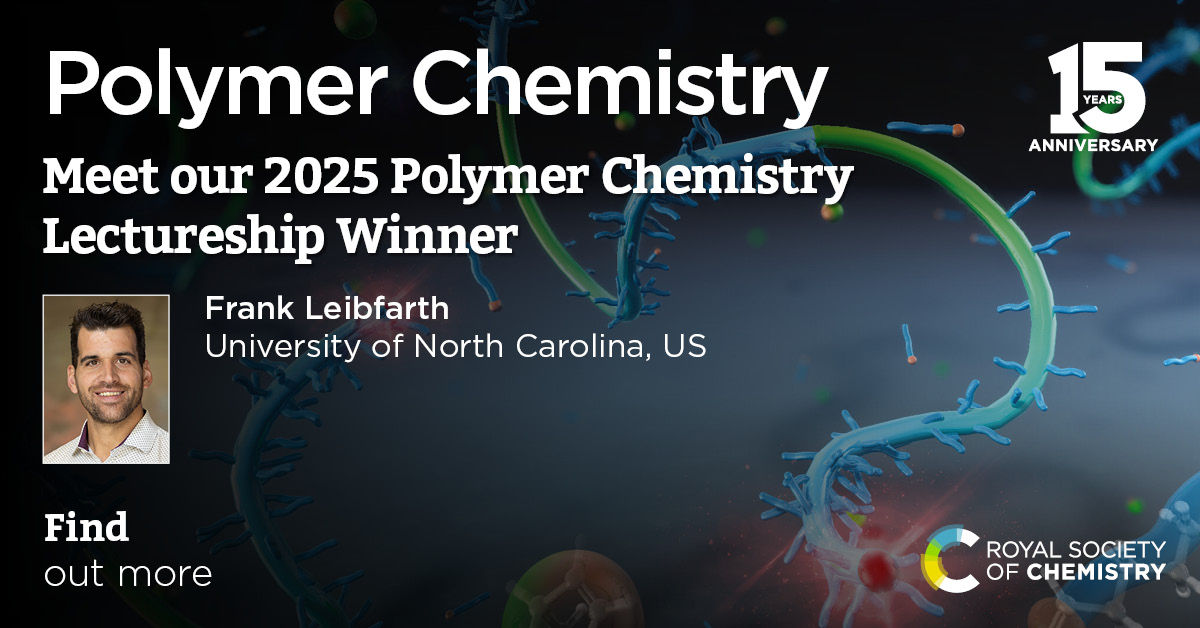We are delighted to announce Professor Frank Leibfarth (University of North Carolina, USA) as the recipient of the 2025 Polymer Chemistry lectureship!
This award, now in its eleventh year, honours an early-career researcher who has made significant contribution to the polymer chemistry field. The recipient is selected by the Polymer Chemistry Editorial Board from a list of candidates nominated by the community.
Frank Leibfarth attended the University of South Dakota, where he was a Goldwater Scholar and graduated in 2008 with degrees in Chemistry and Physics. In that same year, he began a Ph.D. program in chemistry at the University of California Santa Barbara under the direction of Professor Craig J. Hawker. In 2013, Frank began his postdoctoral studies at MIT under the direction of Professor Timothy F. Jamison as an NSF Fellow. He began his independent career in 2016 at the University of North Carolina, where he is an Associate Professor in the Chemistry Department. The overarching goal of the Leibfarth group is to develop synthetic methods that transform readily available starting materials into functional and sustainable thermoplastics with molecular-level precision.
To accomplish these goals, his group leverages polymer chemistry, organic chemistry, and continuous flow chemistry to provide potentially useful solutions to challenges in sustainability and human health. The work of Professor Leibfarth’s group has been recognized by the Beckman Young Investigator award, the Popular Science Brilliant Ten recognition, the Presidential Early Career Award in Science & Engineering, and the Sloan Research Fellowship, among others. At UNC, Prof. Leibfarth has been recognized by the Tanner Award for Excellence in Undergraduate Teaching and as the Winter 2021 commencement speaker.
To learn more about Professor Leibfarth’s research, have a look at his most recent publication in Polymer Chemistry “A dual initiator approach for oxygen tolerant RAFT polymerization“, which is free to access until 31st August 2025. You can also check out articles from our previous lectureship winners in our lectureship winners collection.
 |
“I’ve always looked to Polymer Chemistry as a leading journal to publish fundamental advances in polymer synthesis and polymer science” |
Read our interview with Professor Leibfarth below:
How has your research evolved from your first article to this most recent article?
In some ways, our group has completely transformed from our first article (which was published in Polymer Chemistry!) to now. At our core, however, we have always desired to advance the field with every paper we publish. Our group has always cared deeply about every paper we put out into the community, and we put maximum effort and rigor into each. These days we have better tools and more collaborators than we did as a new lab. In that way, we are probably a bit more sophisticated than we were at the beginning. That said, we still try and constantly question our assumptions, be as creative as possible, and get better every day.
What excites you most about your work and what has been the most exciting moment of your career so far?
It’s still the simple things that get me out of bed in the morning. There is no bigger joy than a student discovering something completely new or unexpected. The key experiment that starts us down a path toward solving a mystery and the immense satisfaction when we figure it out will be forever intoxicating.
The most exciting moments of my career are every time a student or postdoc gets their dream job. As I tell everyone, the point of joining our lab is to leave. The concept that the group we have built can have a small role to play in someone’s life journey is incredibly rewarding.
In your opinion, what are the most important questions to be asked/answered in your field of research?
Polymers are wonderfully complex. Their function is derived from not only their chemical composition, but also how they fold, assemble, crystallize, and entangle. This multiscale behavior, however, makes it incredibly difficult to predict a materials’ properties from first principles. Discovering this skeleton key would accelerate the discovery of materials to solve many societal challenges.
How do you feel about Polymer Chemistry as a place to publish research on this topic?
I’ve always looked to Polymer Chemistry as a leading journal to publish fundamental advances in polymer synthesis and polymer science. The journal does a great job curating a diversity of topics that highlight the most exciting modern areas in the field. I also think Polymer Chemistry has a particular strength with its international presence. The broad authorship and readership of the journal set it apart from its peers.
Which of your Polymer Chemistry publications are you most proud of and why?
Our group’s first ever publication was in Polymer Chemistry as part of the 2018 “Emerging Investigators” collection. This paper holds a special place for our group for a number of reasons. Seeing it published gave our nascent group so much confidence that we were moving in the right direction. It was also the first study in our group that combined flow chemistry and polymer chemistry, which is still an area of active research almost 9 years later.
In which upcoming conferences or events (online or in person) may our readers meet you?
I am excited to be attending the Fall ACS Meeting in Washington D.C. and the Pacifichem 2025 in Hawaii.
Can you share one piece of career-related advice or wisdom with early career scientists?
Take risks and trust your instincts. Being a scientist is an incredible privilege. Your job is to discover new things! Push the boundaries of what is possible whenever you get a chance. The world is relying on you to make it better.
How do you spend your spare time?
I am happiest if I am doing something active with my two young kids, whether it be hiking, soccer, golf, or biking.
We would like to thank everybody who nominated a candidate for the 2025 Polymer Chemistry Lectureship. The Editorial Board had a very difficult task in choosing a winner from the many excellent and worthy candidates.
Please join us in congratulating Professor Leibfarth on winning this award!














